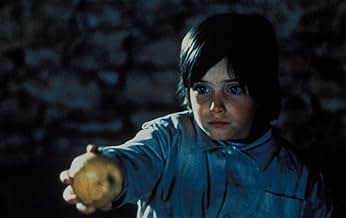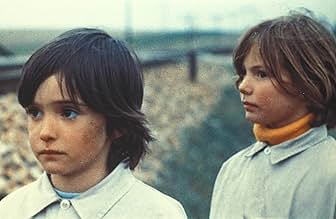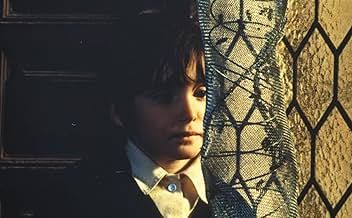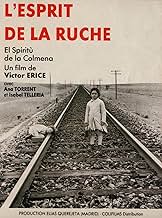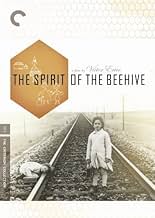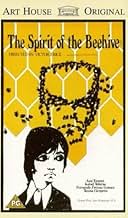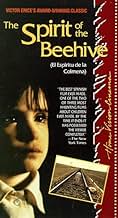Spanien 1940: Durch den Film Frankenstein traumatisiert, taucht ein sensibles siebenjähriges Mädchen aus einem kleinen Dorf in ihre eigene Fantasiewelt ein.Spanien 1940: Durch den Film Frankenstein traumatisiert, taucht ein sensibles siebenjähriges Mädchen aus einem kleinen Dorf in ihre eigene Fantasiewelt ein.Spanien 1940: Durch den Film Frankenstein traumatisiert, taucht ein sensibles siebenjähriges Mädchen aus einem kleinen Dorf in ihre eigene Fantasiewelt ein.
- Regie
- Drehbuch
- Hauptbesetzung
- Auszeichnungen
- 7 Gewinne & 1 Nominierung insgesamt
Empfohlene Bewertungen
Without using much dialogue in the movie, Erice artistically comments on the political tension in Spain through potent images and scenes. He uses symbols such as the two young sisters to represent the division between the Republican and Nationalist parties, and the leitmotif of the beehive to represent the "trapped" workers in Spain under Franco. The most amazing aspect is that all of the post-war commentary is said without any words and without mentioning the actual event! It is a "cine de espectáculo," or spectacle cinema, that symbolizes the connection between fantasy in the movies and fantasy in reality. Without knowing the history of Spain, a spectator could misinterpret the movie as a commentary about the imagination of a little girl after viewing the movie "Frankenstein." The character of Frankenstein is a main component contributing to Ana's, the younger sister, interpretation of reality in Spain, and it gains meaning as Frankenstein evolves from a character in the movie to an object of fantasy. It continues to evolve into a man of flesh and bones and finally represents the hope of Ana when all other sources of information in her life turn out to be faulty.
"El espíritu de la colmena" is a powerful movie that uses many metaphors (such as Ana for the young, innocent generation of Spain) to question the interpretation of reality. It is a powerful, artistically made movie that captivates the viewer through images rather than words. It should be seen more than once in order to understand all it's hidden messages.
While there is definitely a point to be made that this film is, first and foremost, a haunting look at the innocence of childhood, the subversive political meaning was something which is primarily the result of an attempt on my behalf to tie all the loose ends together, and the conclusion below is something I arrived at based on my own personal understanding of the narrative.
On the surface, The Spirit Of The Beehive is about a family which attempts to cope with the aftermath of the Spanish Civil War. It bears mentioning that the fact that this film even dares to address the conflict in such a direct manner suggests that, two years before Franco's death, the tight censorship regime in Spain was slowly but surely loosening its grip of the domestic film industry. Up to that point many films made in Spain during the Franco era were only able to address the civil war or Franco's regime in a strongly metaphorical manner or via subversive narratives (a case in point being much of Bunuel's work, albeit done in exile, or Saura's La Caza). In fact, much of Spanish cinema during that point in history can be regarded as an excellent case study in how allegories can be used as a way of averting tight censorship.
That said, political commentary on a tangible level would not have passed the censors even at such a late stage in Franco's reign, and thus most of the criticism in ...Colmena is driven by a sense of mutual understanding between spectator and narrative. The start of the film is a case in point: a shot of a few children watching James Whale's Frankenstein (with the narrator proclaiming that "You are about to see a monster") is followed by a cut to the girl protagonist's (Ana's) father. For now assuming that this narrative is driven exclusively by metaphors, does Victor Erice suggest, with that cut, that the girl's father is the "monster" in question? Or, does he, on a more profound level equate the word father to monster? Franco called himself the "father of the nation", and with that knowledge in mind an audience could easily read that scene as a highly ambiguous, yet still extremely effective, criticism of Franco (ie. suggestively calling Franco a monster). However, due to its strongly ambiguous nature, not a single censor would be able to pinpoint that scene and say, without any discernible doubt, that this is indeed the case. It's a wonderful example of allegorical film-making, and how film techniques can be generally used to make an intrinsic statement which relies as much to the techniques applied as it does on the audience's intelligence and ability to understand the more profound meaning behind the images.
I remember once reading the viewpoint that Ana herself represents the Spanish nation, and I can see what the intention of that statement is when you consider the monster=Franco equation I outlined above. The monster Ana meets in her daydreams (as she imagines meeting the Boris Karloff figure she saw at the Frankenstein screen) is a figure which lulls her into a false sense of security and turns out to be a threatening presence; and the symbolism itself becomes very plain once the monster=Franco and Ana=Spain (though I'll admit that this is not the most original reading of the film, and aditionally one which doesn't even begin to scrape at the amount of symbolism apparent).
If only Erice was as prolific as he is imaginative, since El Espiritu De La Colmena makes up for only one third of his entire output in over thirty years (his other two films being the equally brilliant El Sur and Quince Tree Of The Sun). Needless to say, it's cinematic genius, and a flawless work of art bar none.
The story is elliptically told and demands your participation in making sense of the narrative, but it's also leisurely paced and allows you to breathe in the atmosphere rather than forcing a particular reading on you. One thing you wouldn't guess from reading the other comments is how this is as much a film about nature as about history--it is like a poem of the countryside in winter, with long vistas of stone farmhouses framed against the rising sun. The film with the most similar visual palette is Malick's "Days of Heaven", but that film feels simplistic compared to the full immersion in history and memory presented in this film--a much more complete vision of the past.
Ana Torrent is unforgettable. I can think of no better film about children, yet (as with so many other things in this movie) it doesn't feel forced--these kids aren't just the director's pawns, but real, living beings.
If you get a chance to see it, definitely make the effort.
I found I had a strong empathy for the little girl who is trying to make sense of a story she has been told (in the movie) that has a powerful grip on her heart and imagination, and has an apparent connection with bigger, drastic events the real world, in a way she tries to understand.
I think it is really rather profound and affecting, even if you know nothing of Spanish history.
Wusstest du schon
- WissenswertesCinematographer Luis Cuadrado was going blind at the time this film was made. An assistant would take Polaroids of the scenes and Cuadrado would direct the lighting by looking through a magnifying glass at these pictures. In 1980 Cuadrado committed suicide after he went completely blind and the tumor in his brain became too painful to face.
- PatzerWhen the fugitive jumps from the train and rolls down the hill, he's wearing boots, but in the next shot he's wearing low-cut shoes.
- Zitate
Ana: [unable to sleep] Isabel?
Isabel: [opening her eyes] What?
Ana: [whispering] Tell me what you were going to tell me.
Isabel: [whispering] About what?
Ana: The movie.
Isabel: Not now... Tomorrow.
Ana: Now... You promised. Why did he kill the girl, and why did they kill him after that?... You don't know - you're a liar.
Isabel: They didn't kill him, and he didn't kill the girl.
Ana: How do you know? How do you know they didn't die?
Isabel: Everything in the movies is fake. It's all a trick. Besides, I've seen him alive.
Ana: Where?
Isabel: In a place I know near the village. People can't see him. He only comes out at night.
Ana: Is he a ghost?
Isabel: No, he's a spirit.
Isabel: Like the spirit Dona Lucia talks about?
Isabel: Yes, but spirits have no bodies. That's why you can't kill them.
Ana: But he had one in the movie. He had arms and feet. He had everything.
Isabel: It's a disguise they put on when they go outside...
Ana: If he only comes out at night, how can you talk to him?
Isabel: I told you he was a spirit. If you're his friend, you can talk to him whenever you want. Just close your eyes and call him... It's me, Ana... It's me Ana...
[they hear what sounds like ominous footsteps and are silent]
- VerbindungenFeatured in Sus años dorados (1980)
- SoundtracksOjos verdes
Written by Salvador Valverde (as Valverde), Rafael de León (as León) y Manuel L. Quiroga (as Quiroga)
Top-Auswahl
Details
- Erscheinungsdatum
- Herkunftsland
- Offizieller Standort
- Sprache
- Auch bekannt als
- The Spirit of the Beehive
- Drehorte
- Hoyuelos, Segovia, Castilla y León, Spanien(Town and exteriors)
- Produktionsfirmen
- Weitere beteiligte Unternehmen bei IMDbPro anzeigen
Box Office
- Weltweiter Bruttoertrag
- 190.734 $
- Laufzeit
- 1 Std. 38 Min.(98 min)
- Sound-Mix
- Seitenverhältnis
- 1.66 : 1

![Tráiler [OV] ansehen](https://m.media-amazon.com/images/M/MV5BZDcyMjExODEtZGJlYy00MGNmLWJhZTItNzQ5MTNjNzAzNDQ2XkEyXkFqcGdeQXRyYW5zY29kZS13b3JrZmxvdw@@._V1_QL75_UX500_CR0)
